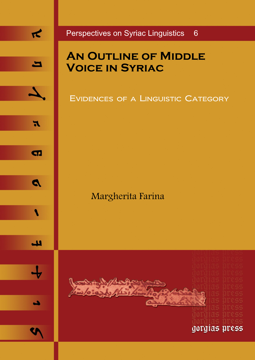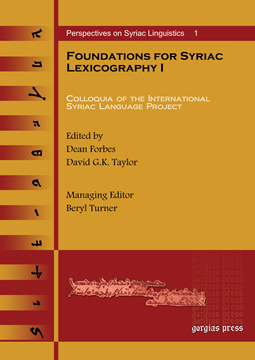Perspectives on Syriac Linguistics
A publication of the International Syriac Language Project (ISLP), this series contains monographs, paper collections, and reference works on Syriac lexicography and related ancient languages.
Foundations for Syriac Lexicography IV
Colloquia of the International Syriac Language Project
Edited by Kristian S. Heal & Alison G. Salvesen
Series: Perspectives on Syriac Linguistics 5
ISBN: 978-1-61143-933-5
The fourth published colloquia of the International Syriac Language Project (ISLP), presenting papers from an international team of authors working to develop contemporary, interdisciplinary approaches to linguistics and lexicography.
$150.00 (USD) $90.00 (USD)
Foundations for Syriac Lexicography V
Colloquia of the International Syriac Language Project
Edited by Jonathan Loopstra & Michael Sokoloff
Series: Perspectives on Syriac Linguistics 7
ISBN: 978-1-61719-027-8
The fifth published colloquia of the International Syriac Language Project (ISLP), presenting papers from an international team of authors working to develop contemporary, interdisciplinary approaches to linguistics and lexicography.
$165.00 (USD) $99.00 (USD)
An Outline of Middle Voice in Syriac
Evidences of a Linguistic Category
Series: Perspectives on Syriac Linguistics 6
ISBN: 978-1-4632-0145-6
This study presents a modern linguistic approach to the function of the Syriac et-verbal prefix. Based on a detailed analysis of a number of early Syriac texts, it proposes a unified account of the different values traditionally attributed to the Syriac et- stems. Farina views the data within a typologically comparative framework derived from a cross-linguistic study of middle conjugations.
$132.00 (USD) $79.20 (USD)
Foundations for Syriac Lexicography II
Colloquia of the International Syriac Language Project
Edited by P. J. Williams; Managing Editor Beryl Turner
Series: Perspectives on Syriac Linguistics 3
ISBN: 978-1-60724-088-4
This volume is part of a series that addresses issues of Classical Syriac lexicography, and the lexicography of other ancient languages. The international team of authors invited to participate represents a wide range of disciplines and opens new horizons in lexical thinking. Essays in this volume discuss taxonomy, the Syriac passive participle, translating Greek verbs with alpha privatives into Syriac, the translation of Syriac particles, and the history of Syriac lexica. This book represents the forefront of Syriac lexical studies, and has much to offer those studying Greek and other Semitic languages as well.
$138.00 (USD) $82.80 (USD)
Foundations for Syriac Lexicography III
Colloquia of the International Syriac Language Project
Series: Perspectives on Syriac Linguistics 4
ISBN: 978-1-60724-072-3
This volume is part of a series that addresses issues of Classical Syriac lexicography, and the lexicography of other ancient languages. The international team of authors invited to participate represents a wide range of disciplines and opens new horizons in lexical thinking. Essays in this volume discuss the place for enclitics in lexica, the grammatical classification of words, translation technique, and using new technologies to aid in the lexicographer’s task. This book represents the forefront of Syriac lexical studies, and has much to offer those studying Greek and other Semitic languages as well.
$166.00 (USD) $99.60 (USD)
Foundations for Syriac Lexicography I
Colloquia of the International Syriac Language Project
Edited by Dean Forbes & David G.K. Taylor
Series: Perspectives on Syriac Linguistics 1
ISBN: 1-59333-138-X
This volume is the first in a series of collected essays that addresses issues of Syriac linguistics as they relate to a contemporary approach to lexicography. The international team of authors invited to participate represents a wide range of disciplines and opens new horizons in lexical thinking. Special emphasis is placed on the role that technology has, does, and will play in the evolving field of lexicography.
$145.00 (USD) $87.00 (USD)






